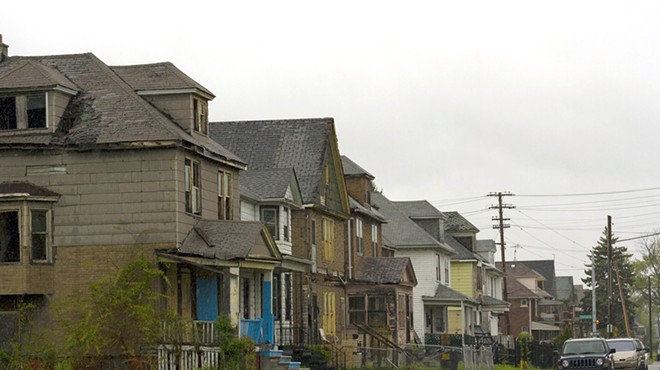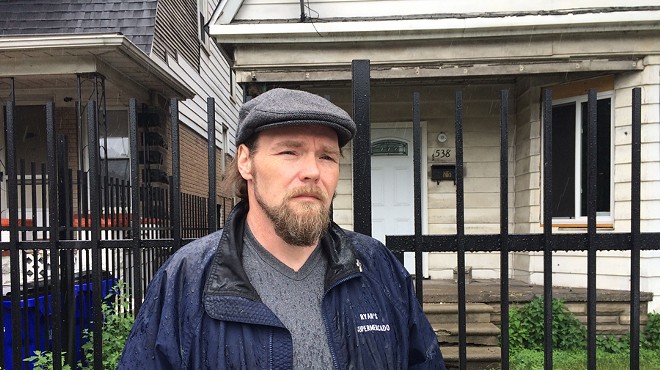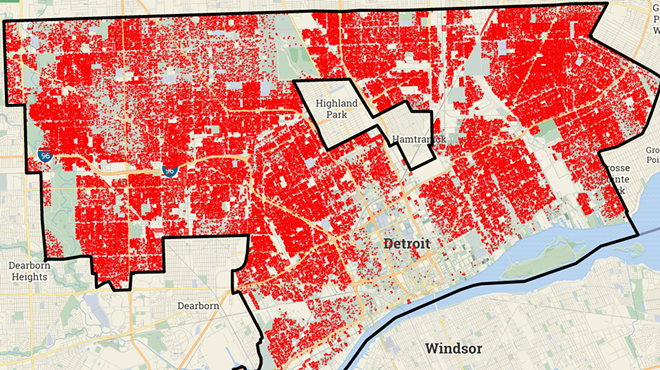When the Free Press sat down with Detroit Mayor Mike Duggan ahead of the Tuesday primary and let him make the case for why he should be re-elected, Duggan reportedly called the notion that more houses in the city are going vacant "absolutely false."
The comment was left on the cutting room floor, and made it onto the Twitter feed of Freep writer Katrease Stafford:
This didn't make it in the story but I told Duggan many have said there's been an increase in vacant homes, particularly on the east side. https://t.co/TnXaAqTLPs
— Katrease Stafford (@KatreaseS_freep) August 4, 2017
He denied it and said it was "absolutely false." Some disagree. Thanks for raising the question, Jerry. https://t.co/TnXaAqTLPs
— Katrease Stafford (@KatreaseS_freep) August 4, 2017
Vacancy is an important issue for Duggan: He has led a demolition effort that has taken down some 10,000 vacant homes over the past few years and has hinged his success as mayor on growing the city's population (though, so far, he has failed in this endeavor). Vacancies should not be up.
Yet, according to at least one study, they are up — up by the thousands since Duggan's demolitions began.
Data mapping company Loveland Technologies arrived at that conclusion by comparing Motor City Mapping property surveys from early 2014 to Detroit Land Bank property surveys from the summer of 2016. The surveys looked at the same set of 63,000 parcels and found that, within two and a half years, an additional 3,148 houses had gone vacant — an increase of 64 percent.
Based on the results, it appears that vacancy is out-pacing the mayor's federally-funded bulldozing effort. Why is that?
For Loveland and others who've been closely watching the situation, tax foreclosures are the likely culprit.
Loveland has been conducting research on Detroit’s tax foreclosure crisis for years and found that, of the occupied tax-foreclosed homes entered into auction in 2014, a sixth — or about a thousand homes — wound up vacant within a year. That study and others have led Loveland to conclude that tax foreclosures are the "engine that produces blight and vacancy.”
The problem has pushed Loveland CEO Jerry Paffendorf to launch an all-out campaign to compel civic leaders (Duggan, Wayne County Treasurer Eric Sabree, and Wayne County Executive Warren Evans) to face the issue head-on. Others, like the Coalition to End Unconstitutional Tax Foreclosures, have embarked on similar efforts (that group is calling for a moratorium on tax foreclosures in Detroit because a study shows a huge chunk of homes facing foreclosure had their taxable property values overassessed — a problem that originated in the Detroit assessor's office, which right now falls under Duggan's purview).
The leaders, however, have appeared resistant to taking further steps to address the problem, touting past efforts they've made to reduce the number of people going into foreclosure, like lowering interest rates on late-paid taxes. Yet, despite such efforts, thousands of Detroiters continue to lose their homes each year.
Which is why it is important to note that Duggan just took a step to cast doubt on some of the only publicly available data that looks at one of the main effects of foreclosure: vacancy.
The news prompted Paffendorf to email the mayor to find out what data he was using to determine vacancies are steady or declining. Duggan reportedly responded that it came to him from the deputy director of the Land Bank, who he said relies on "regular data feeds from DTE, the Census Bureau, DWSD, the U.S. Postal Service, and information from field surveys. He updates the data constantly from these sources."
The mayor then apparently accused Paffendorf of leveling a political attack against him:
"Since you have already had this information shared with you by [Land Bank Deputy Director,] Mr. Linn," Duggan said in the note, "it's obvious your motive for sending these emails is political, not substantive."
You can read about all of the other people running for Mayor Duggan's job in this week's cover story.










